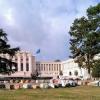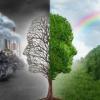News
Displaying Results 101 - 119 of 119
After months of the COVID-19 crisis challenging healthcare systems and undermining economies, governments worldwide are looking for ways to jump-start the economic recovery. Without factoring in environmental concerns, recovery packages risk undermining the foundations for sustainable development, …
An estimated one billion people worldwide live with disabilities. In the European Union, one person in seven among the working age population reports a difficulty with a basic activity – such as walking, seeing or hearing, lifting or carrying, sitting or standing, and remembering and concentrating…
The current patterns of raw material consumption are unstainable and are becoming an existential threat to the planet.
The United Nations Framework Classification for Resources (UNFC) offers a solution to support a total transformation towards a sustainable resource management future. To…
The COVID-19 pandemic has caused wide-ranging effects on human health, security and economic activity, which have significantly impacted industrial safety.
The eleventh meeting of the Conference of the Parties to UNECE’s Convention on the Transboundary Effects of Industrial Accidents (Industrial…
We stand at a critical moment. More than ever, the great challenges we face – like COVID-19, the climate crisis, unsustainable resource use, and inequalities – cannot be faced by one country alone. The 75th anniversary of the United Nations is the time to reflect on how we can best work together to…
The European Green Deal is a new growth strategy aiming to transform the European Union into a modern, resource-efficient and competitive economy. The European Green Deal has a number of overarching objectives, including for the European Union to reach net-zero GHG emissions by 2050; promotion of…
Data can be a matter of life and death. We have seen in recent years how statistical information about the structure of the communities affected by earthquakes or typhoons—how many people, in which age groups, and in which locations—is essential for making quick and informed decisions to mobilize…
The COVID-19 health crisis has caused wide-ranging socio-economic disruption worldwide. This has exposed and aggravated existing social imbalances. The pandemic has called for unprecedented measures to protect those so close to our heart: our parents, grandparents, the elderly and vulnerable.…
With the consequences of COVID-19 still unfolding, one area of major disruption has been to global food systems, resulting in significant increases in food loss and waste.
Today, the first ever International Day of Awareness of Food Loss and Waste, is a wake-up call. We must access and make…
While COVID-19-related disruptions may have impacted people’s mobility and slowed cross-border movements of people and goods this year, pollution knows no travel restrictions. Air pollutants, travelling through our atmosphere, can harm people and the environment even thousands of kilometres…
The countries of the UN Special Programme for the Economies of Central Asia (SPECA) - Afghanistan, Azerbaijan, Kazakhstan, Kyrgyzstan, Tajikistan, Turkmenistan and Uzbekistan - gathered for a virtual session of the SPECA Working Group on Innovation and Technology for Sustainable Development (WG on…
In early March this year, the UN Secretary-General called for countries to step up their efforts and turn deforestation around in order to make 2020 a ‘super year’ for nature.
This call arrived following the release of an alarming report highlighting the unprecedented speed at which ecosystems…
The COVID-19 pandemic and the lockdown measures implemented by most of the governments in the UNECE region have fundamentally changed the way we work, study, communicate, define priorities and function in our everyday life. Governments and international organisations have focused on immediate…
Risk is a part of our everyday lives. When we wear a helmet to ride a bike, for example, we accept a small inconvenience to reduce the risk of a fall or an accident. When a homeowner decides to retrofit their house, they incur a cost to shield against an earthquake or a flood. Faced with the COVID…
Most Governments have responded to the coronavirus disease (COVID-19) pandemic by declaring a state of emergency and by adopting numerous measures to combat the spread of the virus, which have often included restrictions on the freedoms of assembly and movement. This has altered the way in which…
Like so much else in our societies that we had taken for granted before the COVID-19 crisis, the daily commute has for many been temporarily set aside in a makeshift home office.
After weeks of lockdown and confinement, the priority now is to relaunch the economy, while maintaining the necessary…
By UNECE Executive Secretary Olga Algayerova and UN Women Regional Director for Europe and Central Asia Alia El-Yassir
Since the global outbreak of COVID-19, essential workers have been risking their lives in order to protect ours. No expense should be spared to ensure the availability and…
We are living in one of those moments which define history. As it is always the case in such moments, the promise and peril of international cooperation, solidarity and multilateralism inevitably come under the spotlight, as evidenced by the overwhelming media attention given to governments’…
Every year we lose about 14% of the food produced before it is sold, and this does not even include the food never harvested. Even more is wasted at retail and consumer levels. At the same time, over 800 million people worldwide suffer from hunger, while food loss is a major contributor to CO2…






